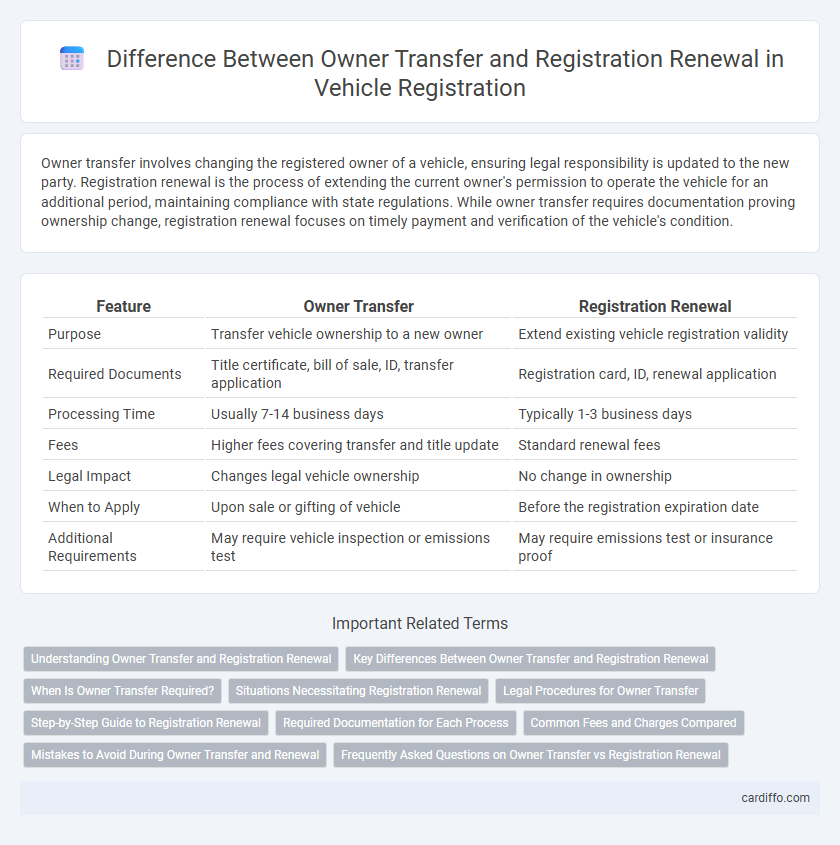Owner transfer involves changing the registered owner of a vehicle, ensuring legal responsibility is updated to the new party. Registration renewal is the process of extending the current owner's permission to operate the vehicle for an additional period, maintaining compliance with state regulations. While owner transfer requires documentation proving ownership change, registration renewal focuses on timely payment and verification of the vehicle's condition.
Table of Comparison
| Feature | Owner Transfer | Registration Renewal |
|---|---|---|
| Purpose | Transfer vehicle ownership to a new owner | Extend existing vehicle registration validity |
| Required Documents | Title certificate, bill of sale, ID, transfer application | Registration card, ID, renewal application |
| Processing Time | Usually 7-14 business days | Typically 1-3 business days |
| Fees | Higher fees covering transfer and title update | Standard renewal fees |
| Legal Impact | Changes legal vehicle ownership | No change in ownership |
| When to Apply | Upon sale or gifting of vehicle | Before the registration expiration date |
| Additional Requirements | May require vehicle inspection or emissions test | May require emissions test or insurance proof |
Understanding Owner Transfer and Registration Renewal
Owner transfer involves legally changing the registered ownership of a vehicle to another individual, ensuring the new owner assumes responsibility and rights. Registration renewal is the periodic process of updating a vehicle's registration to maintain its legal status for operation on public roads. Understanding the distinction helps vehicle owners comply with legal requirements and avoid penalties related to ownership changes or expired registrations.
Key Differences Between Owner Transfer and Registration Renewal
Owner transfer involves changing the legal ownership of a vehicle from one party to another, requiring documentation such as a bill of sale and title transfer forms. Registration renewal only updates the vehicle's registration status for continued legal use, usually requiring proof of insurance and payment of renewal fees. Key differences include the purpose--ownership change versus continued vehicle operation--and the types of documents and fees required.
When Is Owner Transfer Required?
Owner transfer is required when the vehicle changes possession to a new individual or entity, ensuring legal ownership is accurately recorded. Registration renewal, in contrast, is necessary for maintaining the vehicle's active registration status without altering ownership details. Failure to complete the owner transfer can result in legal complications and liability issues for both parties involved.
Situations Necessitating Registration Renewal
Registration renewal is required when vehicle ownership remains unchanged but the registration period expires or the vehicle undergoes modifications affecting compliance. Situations necessitating registration renewal include expiration of the current registration, updates to insurance or address information, and completion of mandatory inspections or emissions tests. Owner transfer pertains exclusively to the legal change of the vehicle's registered owner and does not replace the need for timely registration renewal.
Legal Procedures for Owner Transfer
Owner transfer involves specific legal procedures including submission of a notarized deed of sale, proof of tax payments, and an application for title transfer with the appropriate government agency. Registration renewal primarily requires payment of fees to maintain the validity of the existing registration without changing ownership records. Ensuring compliance with local regulations during owner transfer prevents legal disputes and secures rightful ownership documentation.
Step-by-Step Guide to Registration Renewal
To complete a registration renewal, first gather all required documents, including the current registration certificate, proof of insurance, and payment method for fees. Visit the official motor vehicle department website or office to submit your renewal application, ensuring all personal and vehicle information is accurately updated. Finally, pay the renewal fee and receive your updated registration certificate and sticker, confirming compliance with state regulations.
Required Documentation for Each Process
Owner transfer requires a valid title certificate, a completed transfer application form, proof of identity, and payment of transfer fees, while registration renewal mandates the current registration card, proof of vehicle inspection, and payment of renewal fees. Owner transfer documents must demonstrate legal ownership change, including a signed title and notarized bill of sale, whereas renewal documentation centers on verifying the vehicle's compliance with safety and emissions standards. Understanding these distinct document requirements ensures smooth processing for both owner transfer and registration renewal transactions.
Common Fees and Charges Compared
Owner transfer and registration renewal both involve specific fees, with owner transfer typically incurring a higher cost due to title transfer taxes and administrative processing charges. Registration renewal fees are generally lower, covering vehicle inspection, road use, and standard renewal taxes. Both processes may include additional charges based on vehicle type, weight, or jurisdictional regulations.
Mistakes to Avoid During Owner Transfer and Renewal
Avoid common mistakes during owner transfer such as failing to update title documents promptly or neglecting to notify the DMV within the required timeframe, which can result in fines or legal complications. During registration renewal, ensure accurate vehicle information and payment details are provided to prevent delays or rejection of renewal applications. Ignoring these steps can lead to penalties, lapses in vehicle insurance, or invalid registration status.
Frequently Asked Questions on Owner Transfer vs Registration Renewal
Owner transfer involves legally changing the registered name of a vehicle to a new owner, while registration renewal is the process of extending the validity of an existing vehicle registration without changing ownership. Common questions include the required documents for each process, fees involved, and the timelines within which these actions must be completed to avoid penalties. Understanding the distinction helps vehicle owners ensure compliance with local motor vehicle regulations and maintain up-to-date records.
Owner Transfer vs Registration Renewal Infographic

 cardiffo.com
cardiffo.com